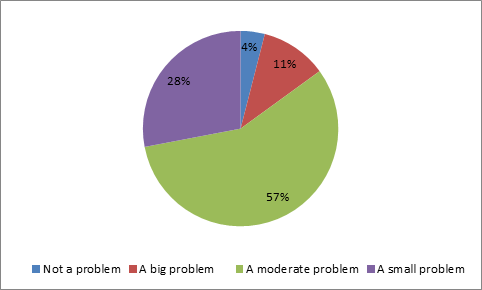So, as I predicted a few days back, Canadian Council of Chief Executives’ CEO, John Manley, gave a speech to the Canadian Club (available here) in which he challenged the conventional wisdom about skills crises – which is presumably why it got zero press coverage. He began by making the following points, based on a survey conducted of 100 major Canadian employers:
- Skills shoratges are a problem, but only 11% of employers said it was a big problem (see graph below);
- The shortages are in IT, Engineering, and skilled trades. Scientists and researchers are the easiest positions to hire;
- When evaluating hires, industry-specific knowledge is only the 6th-most important consideration, behind people skills, communication skills, problem-solving skills, analytical abilities, and leadership skills.
Figure 1. From the Standpoint of Your Company, How Much of a Problem are Skills Shortages?
At this point, however, Manley’s speech took a very weird turn. Having laid out the case for soft skills being the crux of the skills shortage for many companies, he veered into a discussion of Canada’s increasingly mediocre results on PISA/PIAAC literacy and numeracy tests, and why Canada needs to improve. Though it’s hard to disagree with the call for better skills in reading and math, it’s also not immediately obvious how either has a whole lot to do with, say, leadership or people skills.
(Canada seems to suffer from a strange inability to effectively link problems to solutions in education. Need soft skills? More math classes! Need a few more pipefitters in Alberta? Canada Jobs Grant! It’s almost like a form of policy Tourette’s or something – when presented with a skill-related problem, we blurt out whatever’s already on our mind, rather than work out some kind of reasoned response.)
Anyways, all of this aside – it occurred to me that there’s an enormous branding opportunity for an institution that actually decided to put “soft skills” at the core of its curriculum. Pretty much all of them, save leadership, can be taught through something not a million miles from an existing curricula – and even that could be incorporated without too much difficulty.
Certainly, to be credible you’d need to make a full-scale curriculum revamp, which would be neither simple nor quick; but think of the upside for a university or college: a school that put leadership and communication at the core of its curriculum would be offering something that is both in line with the traditional liberal arts (rhetoric was one of the seven liberal arts, after all) but that is also fundamentally in line with what today’s employers want. It would give a school an interesting sales pitch both to employers and students.
I’m not sure every school would want to do it, but for small-to-medium size schools with enrolment challenges (e.g. Trent, Acadia, St. Thomas), “Soft Skills U” would be an interesting niche to try to occupy – if it were done seriously, and not simply slapping a label on what the institution already does.


 Tweet this post
Tweet this post

Is your graph mislabeled, because it says 28% thought it was a big problem, not 11.
Text and graph do not agree on “big problem” %
I found your blog quite interesting and I appreciate what it does in terms of providing me a easy access and insight into discussions that I would normally not have time to participate in. However, I take difference with you suggestion that math and reading have little to do with soft skills, especially because you already identified that soft skills refer to communications, problem solving and analytical skills. Reading is the base for developing good communication skills. Reading good writing allows one to develop good writing skills which leads to good speaking skills; all three being important to communication. Mathematics is problem solving and develop analytical skills; albeit, there may be less painful ways to do this and certainly is not my preference.
Thanks
Tom
According to the chart above, 28% of employers – not 11%, as stated – suggested that skills shortages were a big problem. Or am I misreading?
No, I just reversed the numbers on the chart. Sorry about that – will fix.